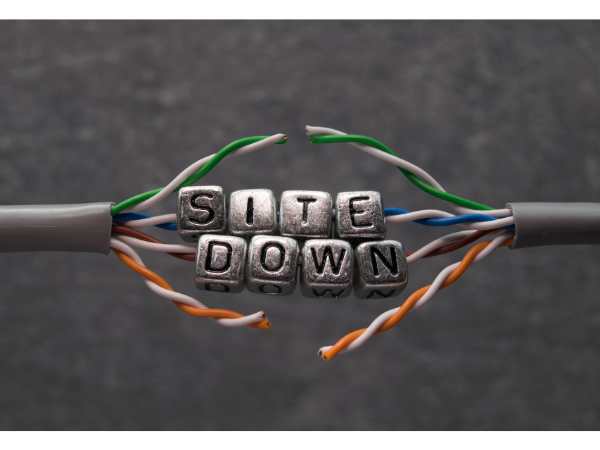Website Ownership: 8 Hidden Truths You Need To Know

Building a website is the first step in establishing your business in the digital space. Despite this, many businesses stumble in creating a website that suits the needs and expectations of their consumers.
Countless misconceptions about websites and web development result in many businesses falling behind in the digital space. Here, we will uncover 8 hidden truths you need to know.
You might know that you need a website for your business, and jump at building one that seems easy to do on your own but without realizing the implications.
What do websites do?
In the age of social media, some might mistakenly downplay the importance of their business’ website, however, this is essentially your digital brick and mortar storefront. Managing an account on Instagram, TikTok, Facebook, LinkedIn, etc. — it can be a headache. Without a website, however, it will be a headache for your audience too.
With more digital channels than ever, it’s essential to have a website that will connect them. Your website can host content, link to social media pages, and direct your audience to the services your business provides. Regardless of what you need your website to do for your business, it will essentially represent your brand.

Building Your Website
Building a website takes a lot of time, knowledge, and experience. This is why it’s necessary to hire the right people to help you build your website. Working with a digital agency like Media Rebel helps bridge the gap between your website and advertising strategy.
Some web development drag and drop platforms (such as Wix, GoDaddy, or Squarespace) offer an “easy-to-use” content management system to build and host your site. However, this is not the most effective strategy for many businesses. While the monthly rate appears cheaper than hiring the help of a web developer, the drawbacks might outweigh the benefits.
The cheaper price often means that you miss out on important features and privileges.
This brings us to our first hidden truth:
Truth #1: Evaluating website costs can be tricky
Estimating a "good price" for a website is tricky because of the many different methods of having this done. Not to mention the continuous fees associated with maintaining, updating, and running your website.
Hiring a web developer to build your website offers you greater benefits than cheaper drag and drop website builders, but the cost can seem daunting. The important thing to remember is that no website is an upfront investment. There are continuous fees associated with owning a website.
Using a “software as a service” (or SAAS) platform means that you are paying a monthly fee for as long as you are running that website. This model can be cost effective, but you’re at the mercy of that platform’s servers, themes, and bugs.
Hiring a web developer is more expensive, but far more reliable. We’ll get further into detail about the benefits of this, but remember that there are also continuous costs regardless of how you build your website.

Ownership Of Your Website
Many businesses will build their website on a drag and drop web developing platform like Wix or Squarespace, and later regret the decision when they realize the drawbacks. Perhaps a data breach has revealed the flaws in security. The owner decides to switch their website to another platform only to find that they are unable to.
Truth #2: Most drag and drop web developers are non-transferrable
Ownership of your site is a major point of contention. Wix, Squarespace, GoDaddy: these platforms are accessible to those without coding experience, but they lock your website onto that platform. If, at one point, the platform no longer supports your needs as a business, you’re left to rebuild a website from scratch.
Think of it like renting a home with provided furnishing. It’s much easier than shopping for furniture and building your house from the ground up, but you can’t take anything with you when you decide to move.
Many of these platforms have restrictive limitations on how you can build them. You may have features, layouts, or ideas that you want to implement on your site, but can’t because the platform doesn’t allow that change.
Truth #3: You might have limited rights to your website.
Whether you are using a SAAS platform or hiring a web developer, it’s necessary to thoroughly review what you own and have rights to.
Web building platforms will typically provide you with themes and templates to assist you in building your website. If you don’t have coding experience, these are extremely useful tools. However, you likely will not own the rights to these themes. This is one of the reasons you can’t simply transfer your website between CMS’s.
With an agency or web developer, the rights to the website and code are generally given to you after you’ve paid it off. Then, you are free to update, add, or transfer the website as you please. Depending on the contract, however, you might have limited rights to your website. This is why it’s important to properly vet and approve of the developer and contract you’re agreeing to.
Fundamentally, owning the code to your website is much more secure than hosting it on another platform’s servers.

Truth #4: Website security is at stake using drag and drop website builders.
The limited control of using drag and drop web builders means that you have less control over the security of your website. If you’re signing up consumers to a mailing list, you want them to feel safe knowing their information is secure.
If you’re using a website building platform, you’re using the same code as thousands of others. You’re putting your website at risk to hackers who are drawn to these platforms.
For platforms that offer shared hosting, one compromised site can potentially impact others on the same server. Your website is also vulnerable to crashes and errors out of your control to fix.
Your business website is likely to take advantage of third party integrations. These can help you provide better services and user experience on your website. However, some of these can put your site at risk. Don’t fall for third party integrations that promise good deliverables without properly vetting them for security.
Of course, owning your own website has security risks of its own. If you are working with a trusted and effective developer, however, you will be much better off. And it's not just security that a good web developer can ensure in your site.
Truth #5: Your website should have a responsive web design.
Too often businesses have failed to properly vet their web developers, only to be left with a broken and poorly designed website. Responsive web design is exactly what it sounds like: website design that responds to the users.
An obvious, but commonly missed, example of responsive design is a website that functions properly on all devices. Have you ever opened a website on your smartphone and find it impossible to navigate? This means that the site is not properly responding to the screen you're viewing it on.
Padding is the space between your content and the margin of your website. When adjusting to different screens, this can cause your website to appear messy if it’s not properly designed.
Your links and menus should all function and be seamless. If your users are struggling to navigate your website, they’ll get the impression that your business is disorganized. Remember: If your site is broken, your business looks broken.
Make sure that the important information and services are accessible to users. A contact form should be visible on every page, so that consumers can reach you.
When you own your website, it’s easier in the long run to provide a reliable and professional digital experience to your audience.

Truth #6: The benefits of owning your own website outweigh the costs.
Hiring an agency or developer to build your website can feel like an overwhelming task in comparison to the cheaper options. However, the benefits of owning your own website will save you countless headaches.
When using drag and drop web building platforms, you run the risk of your site being attacked by association to the software. While your website might not be the target of a hack, you’re a part of a system that is constantly under attack.
One of the most important precautions to protecting your website is backing up the data. While CMS’s like GoDaddy offer the option to backup your website, they’re saved to their servers. A reliable backup is saved off-site, which is what makes owning your own website safer. You own the code, so you’re able to save the data off-site.
Finally, owning your own website means you aren’t beholden to the resource limitations of a shared hosting platform. Your site’s performance can suffer if the needs exceed the available resources provided by the service.
Using an agency or web developer is a more reliable strategy, but not all developers are reliable.
Truth #7: Some agencies and developers use these cheap platforms
If a web developer is offering a cheap price and quick service, be wary of what they are offering. Many agencies and developers use these proprietary systems to provide a cheaper, quicker, and lower maintenance website. In this case, you won’t own the website and associated benefits.
This is why it’s essential that you properly vet who you’re working with by also knowing what questions to ask, such as, what CMS do they use to build websites, will you have ownership, what is their security practices.

Finding a Reputable Developer to build your website
You may have decided to search for a web developer to create a website for your business. Now, you must select a reputable developer that will suit your needs and offer a reliable service.
Some dishonest developers will confuse you with technical jargon, attempting to conceal the faults in their practices. Reviewing their portfolios is a great way of ensuring that the end product will align with your needs.
Not only are you looking for a reliable and honest service, but a developer who will be able to meet your vision. A business looking for a highly interactive website will likely work with a different agency than one looking for a clean and professional site.
Communicating with the developer before you agree to a contract is necessary. You might need to contact this person quickly to fix issues and update the website. Make sure that the developer you’re working with is interested in providing your business with a personalized and helpful website, rather than simply making money off of you.
An important part of your relationship with a web developer will be in the continuous updating and improving of your website. An ineffective developer may not bring you the timely fixes you need to keep your business running online.
Optimizing and Monitoring Your Website’s SEO
If you’ve read our other blogs, you’ll notice that we consistently emphasize optimization. We do this because it can make or break your digital marketing strategy. Too often, we meet with clients who paid other agencies for websites, content generation, and ad placements, but those agencies failed to monitor and optimize.

Truth #8: The work doesn’t stop when your website is built: Optimization
You can monitor your website using a number of free tools. Google Search Console is a resource that allows you to monitor, maintain, and troubleshoot your website’s presence. While you don’t need your website to appear in organic search results, you can use the tool to understand performance and errors.
Additionally, Google Analytics is an essential tool in tracking your website. Analyzing the number of visitors and bounce rate can help you understand how well your website is doing. It also shows how users interact with your site and how they find it. Analytics can get complicated, so hiring a digital agency for optimization might be preferable.
How often you should be SEO optimizing your website depends on multiple factors, and most experts don’t agree on an exact number. It can vary from monthly to quarterly, but all agree that updating your SEO is vital to your organic reach. A digital agency can help develop a plan based on your specific business and website. Ultimately, it’s wise to update your website content for SEO and optimization at least once a quarter.
Conclusion
Creating and maintaining a website is an overwhelming project for your business. You have to invest the time and resources to do it right the first time, so you aren't left with more work in the future.
This is why it's beneficial to hire a digital agency, like Media Rebel, to help you in this process. We have the knowledge and passion for the digital world, allowing us to take a holistic approach to strategy.
If you aren’t developing a holistic digital strategy, a strong website won’t do you much good. And if you haven’t developed a strong website, your digital strategy will be missing a key component.
For more information on why a digital agency can help your business, read our blog here. For an explanation of what we do as an agency in digital advertising, click here to our blog.
